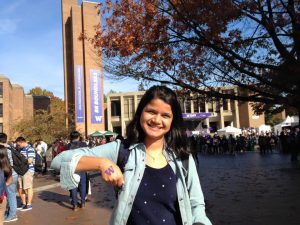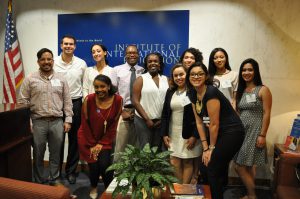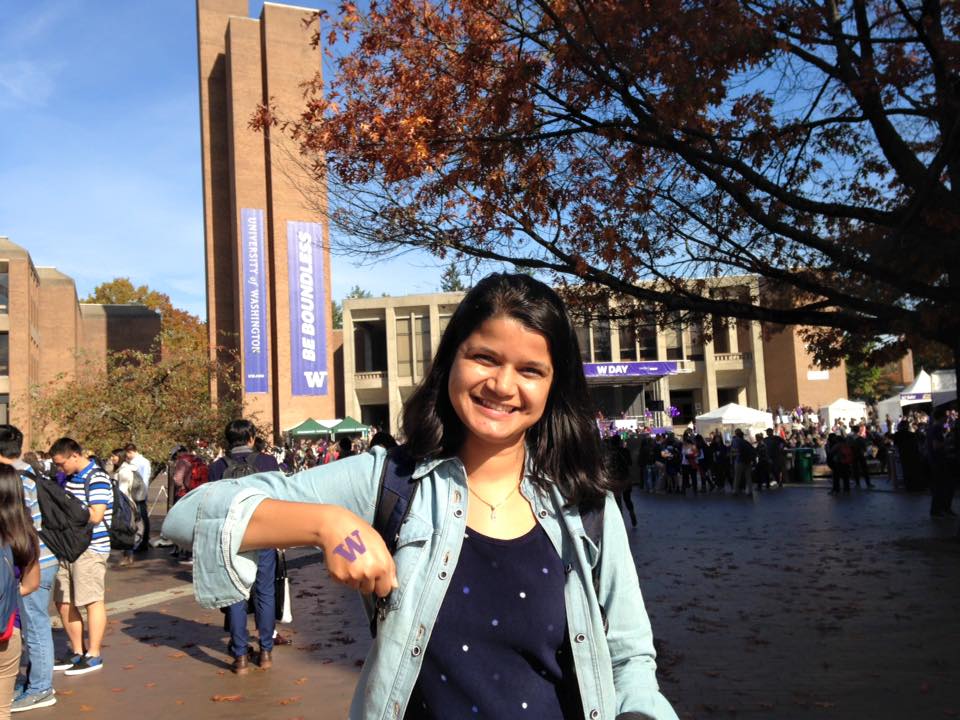Being a Cultural Ambassador: Representing Yourself or Your Country?
January 23, 2017
Anu Aryal, 2015-2017, Nepal, showing some husky spirit during University of Washington Day in Seattle
“I will show my culture during cultural events in school, from our national heritage, to festivals and foods.” When I was answering questions during my Fulbright selection interview back in Nepal two years ago, I was aware that one of the expectations of participating in the Fulbright Foreign Student Program is to fulfill the role of cultural ambassador. But little did I know that the role is not limited to festivals and events, but includes my day-to-day interactions with people in the United States.
Whenever I speak with people within my host institution, the University of Washington, or outside, I realize that not only do I represent myself, but my country as well. During dinners I would say “Sorry, I don’t eat meat, I am a vegetarian”, and the next question would be “Are most people in Nepal vegetarian?” Sometimes, even with strangers, when I am not talking about myself, I would get questions such as “Do people in Nepal speak English well like you?” I appreciated these curiosities and clarified, in my response, that many people in Nepal do eat meat, and not all Nepali speak English. Initially, I didn’t notice this much, but the pattern continued. I would say something about myself and then get asked if I represented a “typical Nepali,” and in most cases my answer was no.

The 2016 cohort of Mount Sinai’s International Exchange Program for Minority Students visiting the Institute of International Education (from left to right, back row): Grant Quiller, Andrew Fisher, Hanna Amanuel, Lanaiar Lett, Waru Gichane, Liz Alvarez, Rayven Plaza, Taylor Jamerson, Mayra Orozco-Llamas; (front row, left to right): Ala Mansour and Natalie Fernandez.
Ten years ago, Athena Fulay, Senior Manager for Institutional Engagement at the Council for International Exchange of Scholars and my longtime outreach colleague from the Fulbright Scholar Program, forwarded a request she’d received to host a pre-departure orientation focusing on Fulbright opportunities for a group of minority graduate students pursuing degrees in the health sciences. Since none of the students held PhDs, and therefore wouldn’t be eligible for Fulbright Scholar opportunities, Athena felt it made more sense for me to handle the request and investigate further. I proceeded to respond to the request and asked the Mount Sinai contact about the composition of the group, the program they represented, and how we could best provide whatever information they needed.
In my subsequent email exchanges, I learned quite a bit: Founded in 2005 by Dr. Luz Claudio, Chief of the Division of International Health at Mount Sinai School of Medicine, the group was called the International Exchange Program for Minority Students. Since its inception, the International Exchange Program for Minority Students has been receiving funding from the National Institute of Minority Health and Health Disparities of the National Institutes of Health (NIH) and in 2010 and in 2015, it was re-evaluated and deemed to be an “outstanding” program at the highest NIH score level.

